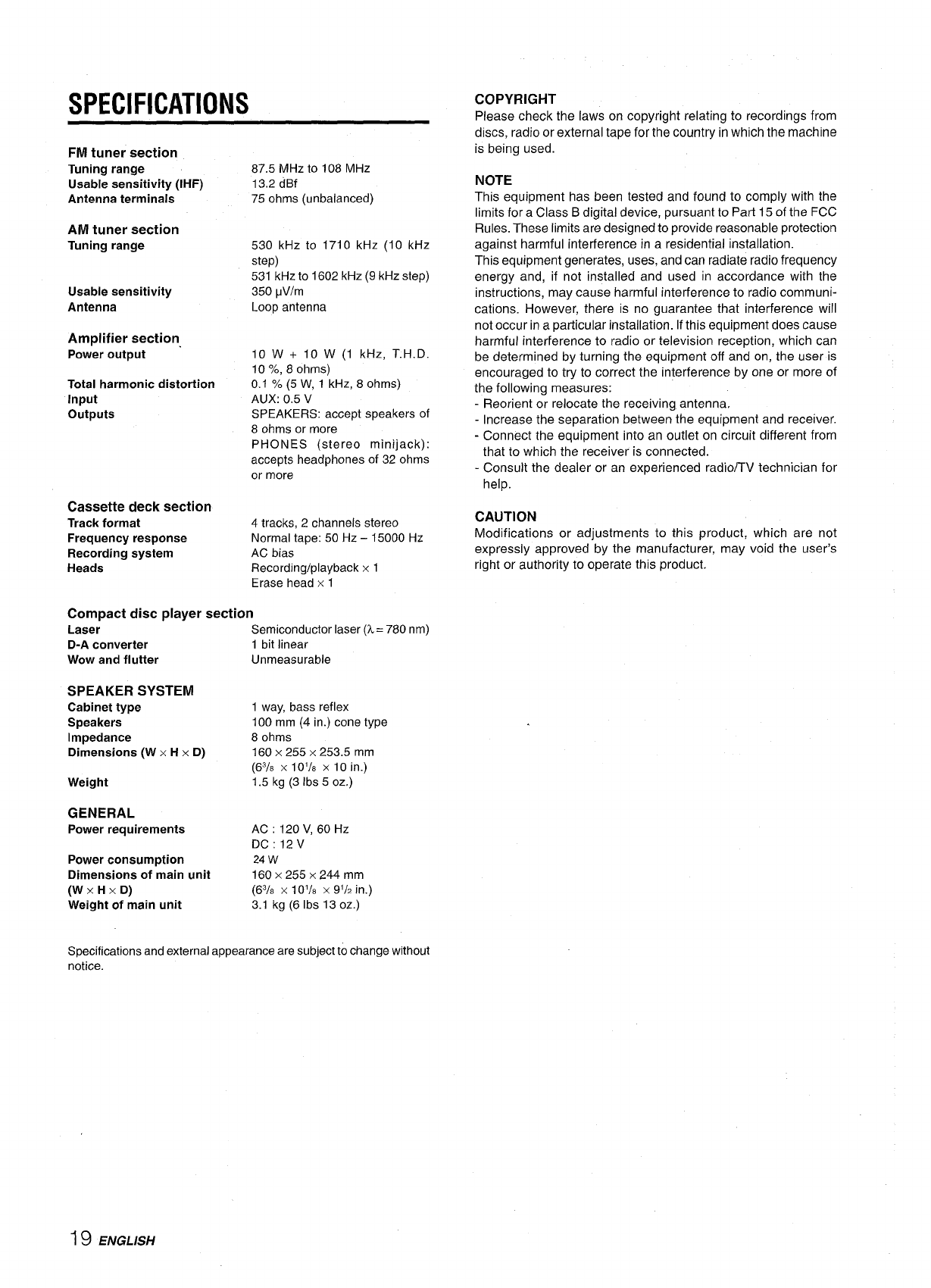
SPECIFICATIONS
FM tuner section
Tuning range
Usable sensitivity (IHF)
Antenna terminals
AM tuner section
Tuning range
Usable sensitivity
Antenna
Amplifier section
Power output
Total harmonic distortion
Input
outputs
Cassette deck section
Track format
Frequency response
Recording system
Heads
87.5 MHz to 108 hfHz
13.2 dBf
75 ohms (unbalanced)
530 kHz to 1710 kHz
step)
(10 kHz
531 kHz to 1602 kHz (9 kHz step)
350 pVlm
Loop antenna
10 W + 10 W (1 kHz, T.H. D.
10 %, 8 ohms)
0.1 % (5 W, 1 kHz, 8 ohms)
AUX: 0.5 V
SPEAKERS: accept speakers of
8 ohms or more
PHONES (stereo mini jack):
accepts headphones of 32 ohms
or more
4 tracks, 2 channels stereo
Normal tape: 50 Hz – 15000 Hz
AC bias
Recording/playback x 1
Erase head x 1
Compact disc player section
Laser
Semiconductor laser (k= 780 nm)
D-A
converter
1 bit linear
Wow and flutter
Unmeasurable
SPEAKER SYSTEM
Cabinet type
1 way, bass reflex
Speakers
100
mm (4 in.) cone type
Impedance
8
ohms
Dimensions (W x H x D)
160 x 255x 253.5 mm
(63/8x 10’/8x
10 in.)
Weight
i
.5 kg (3 Ibs 5 OZ.)
GENERAL
Power requirements
AC:120V,60HZ
DC:12V
Power consumption
24 W
Dimensions of main unit
160 x 255 x 244 mm
(W XHXD)
(63/8x 101/, x 91/2in.)
Weight of main unit
3.1 kg (6 Ibs 13 OZ.)
COPYRIGHT
Please check the laws on copyright relating to recordings from
discs, radio or external tape for the country in which the machine
is being used.
NOTE
This equipment has been tested and found to comply with the
limits for a Class B digital device, pursuant to Part 15 of the FCC
Rules. These limits are designed to provide reasonable protection
against harmful interference in a residential installation.
This equipment generates, uses, and can radiate radio frequency
energy and, if not installed and used in accordance with the
instructions, may cause harmful interference to radio communi-
cations. However, there is no guarantee that interference will
not occur in a particular installation. If this equipment does cause
harmful interference to radio or television reception, which can
be determined by turning the equipment off and on, the user is
encouraged to try to correct the interference by one or more of
the following measures:
- Reorient or relocate the receiving antenna,
- Increase the separation between the equipment and receiver.
- Connect the equipment into an outlet on circuit different from
that to which the receiver is connected.
- Consult the dealer or an experienced radio/TV technician for
help.
CAUTION
Modifications or adjustments to this product, which are not
expressly approved by the manufacturer, may void the user’s
right or authority to operate this product.
Specifications and external appearance are subject to change without
notice.
19 ENGLISH


















